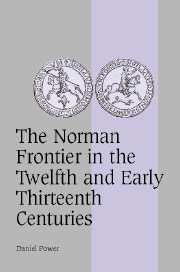Book contents
- Frontmatter
- Contents
- List of maps
- List of tables
- Preface
- Notes on names, dates, manuscripts and coinage
- Note on maps
- List of abbreviations
- Introduction
- Part I PRINCELY POWER AND THE NORMAN FRONTIER
- Part II THE POLITICAL COMMUNITIES OF THE NORMAN FRONTIER
- Part III THE POLITICAL DEVELOPMENT OF THE NORMAN FRONTIER
- Conclusion
- Appendix I Genealogies
- Appendix II The campaigns in eastern Normandy (1202)
- Bibliography
- Index
Introduction
Published online by Cambridge University Press: 22 September 2009
- Frontmatter
- Contents
- List of maps
- List of tables
- Preface
- Notes on names, dates, manuscripts and coinage
- Note on maps
- List of abbreviations
- Introduction
- Part I PRINCELY POWER AND THE NORMAN FRONTIER
- Part II THE POLITICAL COMMUNITIES OF THE NORMAN FRONTIER
- Part III THE POLITICAL DEVELOPMENT OF THE NORMAN FRONTIER
- Conclusion
- Appendix I Genealogies
- Appendix II The campaigns in eastern Normandy (1202)
- Bibliography
- Index
Summary
In the twelfth century the borderlands of the duchy of Normandy enjoyed an importance reaching far beyond the rolling hills and narrow rivers that skirted the duchy. Thanks above all to the astounding achievements of its most famous ruler, William the Conqueror, Normandy had emerged in the previous century as one of the most powerful and important principalities in western Europe. However, its land frontiers were often troubled by warfare between the dukes of Normandy – who were more often than not also kings of England – and their neighbours, especially the Capetian kings of France. These conflicts imbued the province's borders with exceptional political significance. Just as significant, however, was the complex relationship between the duke and the aristocratic élites that dominated the frontier districts, which had far-reaching consequences for the history of the duchy and its neighbours.
The Norman frontier has often attracted the attention of historians of Normandy as one of several distinctive facets of the Norman ‘state’, but much less attention has been paid to the societies that inhabited the marches of the duchy. The period of Plantagenet or Angevin rule in Normandy (1144–1204) has been particularly neglected, despite its importance to the history of the Angevin ‘empire’.
- Type
- Chapter
- Information
- Publisher: Cambridge University PressPrint publication year: 2004



